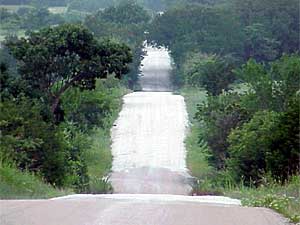|
Photos
Resources
Your Voice
|
Coleman proposes 'rural renaissance'
October 29, 2003
Sen. Norm Coleman, R-Minn., has introduced a bill designed to revitalize rural communities. The Rural Renaissance Act would spend $50 billion on rural infrastructure projects in the next couple of years. Coleman says the money will help rebuild rural communities and create jobs.
St. Paul, Minn. — Coleman says rural America can't afford to upgrade its aging infrastructure. He says it's estimated that in rural Minnesota alone, communities will need $7 billion in infrastructure improvements in the next couple of decades.
Coleman's bill would borrow money for projects such as wastewater treatment plants, affordable housing, and high-speed Internet access. He says pumping $50 billion into rural projects will create jobs.
"Without infrastructure, it's tough to grow jobs ... it's tough to have the sustainability of communities," Coleman says. "I've always believed that investing in roads, investing in infrastructure grows jobs. I believed that as mayor of St. Paul."
Coleman's bill would create a nonprofit Rural Renaissance Corporation to distribute the $50 billion. That would take the project selection out of the hands of Congress.
Coleman's bill isn't the only effort to help rural communities moving through the Senate. A bill sponsored by Sen. Byron Dorgan, D-N.D., called the New Homestead Act, would give tax incentives to people who live in rural communities with declining populations. It also includes tax breaks for businesses that expand or move to rural counties.
|
At some point, if we don't have acts like this, and investments, there's not going to be anybody left out here.
- Ron Obermoller, Minnesota Corn Growers Association |
Some question whether such incentives work in the long run. Jack Geller, president of the Center for Rural Policy and Development in St. Peter, says many of the incentives in the Dorgan bill have been tried before. He says for every success story, there are many more people who've left rural communities. He says the Coleman bill appears to have more potential to help rural areas.
"I do like the more positive approach of, 'Let's make the infrastructure, let's make the environment more attractive,' as opposed to saying, 'Yeah, we recognize the deficits, but we'll make it up to you with certain incentives,'" says Geller.
Geller says the size of the Coleman bill dwarfs other rural programs. He says $50 billion could make a serious dent in the enormous infrastructure needs of rural communities.
Political scientist Joe Kunkel from Minnesota State University in Mankato says the timing of Coleman's bill is interesting. Kunkel says the bill introduction comes shortly after Coleman voted for a bill authorizing $87 billion to rebuild Iraq.
"I think the word on the street and in a lot of small town cafes is going to be, 'Well, why are we spending this money to rebuild their infrastructure, to help them get clean water and electricity, when there are needs in our own communities?'" says Kunkel. "So to a certain extent, this innoculates the senator against something like that, it gives him something to talk about."
Coleman says he started talking about a rural revitalization bill this summer, before the Iraq bill came before Congress.
Kunkel says Coleman's bill may be a long shot, given the government's fiscal crunch. He also says Coleman may face criticism for singling out rural projects over urban and suburban needs.
Coleman's bill has the support of 19 rural and agriculture groups, including the Minnesota Corn Growers Association. President Ron Obermoller, who farms near Brewster, says his group is interested in any bill that helps rural Minnesota.
"At some point, if we don't have acts like this, and investments, there's not going to be anybody left out here," he says.
Obermoller says the bill's list of eligible projects includes farmer-owned agriculture and energy initiatives, which could mean ethanol and biodiesel plants.
Coleman says it's too late in the session to get his bill through this year, but he'll work on it next year.
|
News Headlines
|
Related Subjects
|

